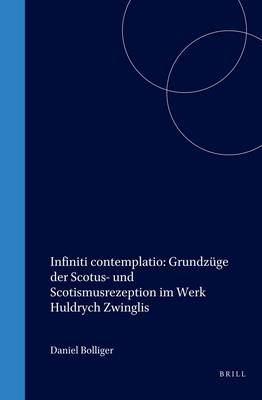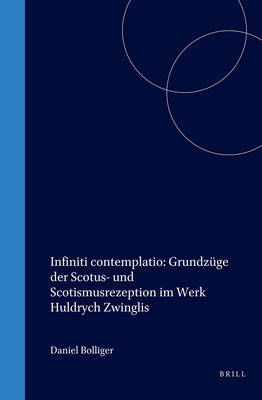
- Afhalen na 1 uur in een winkel met voorraad
- Gratis thuislevering in België vanaf € 30
- Ruim aanbod met 7 miljoen producten
- Afhalen na 1 uur in een winkel met voorraad
- Gratis thuislevering in België vanaf € 30
- Ruim aanbod met 7 miljoen producten
Zoeken
Infiniti Contemplatio: Grundzüge Der Scotus- Und Scotismusrezeption Im Werk Huldrych Zwinglis
Daniel Bolliger
€ 236,95
+ 473 punten
Omschrijving
Infiniti contemplatio provides the first thorough inquiry of Zwingli's roots in late medieval, particularly Franciscan, thought - based on an extensive editorial appendix presenting annotations of Zwingli to Duns Scotus, Stephanus Brulefer, the Theologia Damasceni and extracts of Konrad Summenhart and John Eck.
After a survey of previous research (part I), the evolution of the Scotistic ideas of actual infinity and formal distinction is traced from high scholasticism via Duns, Mayronis, Ockham, Brulefer, Mair and others up to about 1510 (part II), leading to Zwingli's reception, manifest from 1525 onward and contributing to Reformed confessionalization (part III).
A key for Zwingli's adaption of scholasticism proves to be a distinctly dual, but partially convergent reception of Scotus in Scotism and Ockhamism - and hence the two wings of early Reformation.
After a survey of previous research (part I), the evolution of the Scotistic ideas of actual infinity and formal distinction is traced from high scholasticism via Duns, Mayronis, Ockham, Brulefer, Mair and others up to about 1510 (part II), leading to Zwingli's reception, manifest from 1525 onward and contributing to Reformed confessionalization (part III).
A key for Zwingli's adaption of scholasticism proves to be a distinctly dual, but partially convergent reception of Scotus in Scotism and Ockhamism - and hence the two wings of early Reformation.
Specificaties
Betrokkenen
- Auteur(s):
- Uitgeverij:
Inhoud
- Aantal bladzijden:
- 848
- Taal:
- Duits
- Reeks:
- Reeksnummer:
- nr. 107
Eigenschappen
- Productcode (EAN):
- 9789004125599
- Verschijningsdatum:
- 25/03/2003
- Uitvoering:
- Hardcover
- Formaat:
- Genaaid
- Afmetingen:
- 173 mm x 243 mm
- Gewicht:
- 1660 g

Alleen bij Standaard Boekhandel
+ 473 punten op je klantenkaart van Standaard Boekhandel
Beoordelingen
We publiceren alleen reviews die voldoen aan de voorwaarden voor reviews. Bekijk onze voorwaarden voor reviews.








